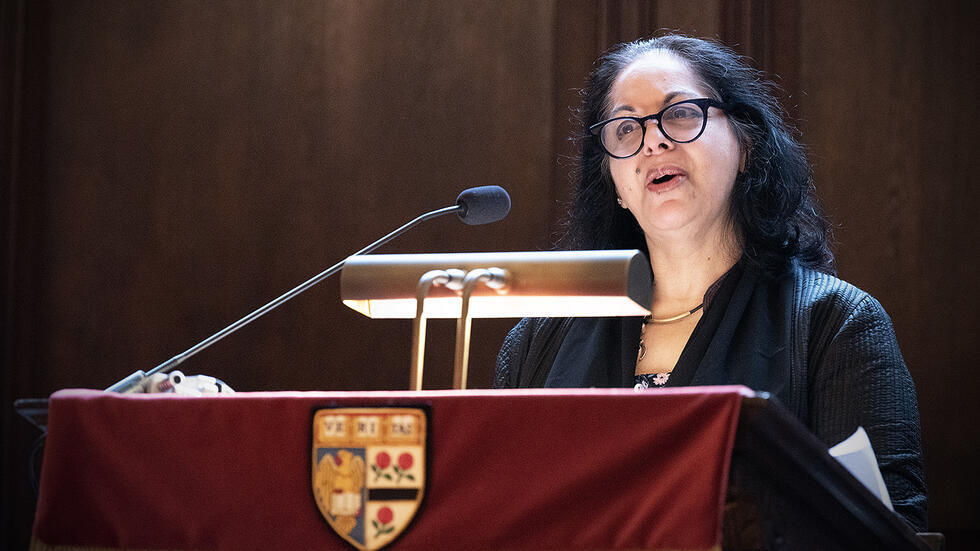 Geeta Pradhan, President of the Cambridge Community Foundation, speaks at Morning Prayers, Nov. 28, 2022. Photo by Jeffrey Blackwell/Memorial Church Communications.
Geeta Pradhan, President of the Cambridge Community Foundation, speaks at Morning Prayers, Nov. 28, 2022. Photo by Jeffrey Blackwell/Memorial Church Communications.
––
––
By Geeta Pradhan
President of the Cambridge Community Foundation
(The following is a transcript of the service audio)
It's beautiful to be back here in this divine space. And as I sat here, I was thinking about hundreds of thousands of people who have prayed in this space for the 400 year history. Isn't that amazing? This space has that spirituality, and it lifts me up. I spoke here just before the pandemic, but much has changed since then, from some personal losses to seeing many in our communities struggle with civil strife, to some of the most divisive times in our country, racism rearing its ugly head, assault on women's rights, and of course, the devastating war on humanity in Ukraine. These local and global events and some recent conversations, as well as personal reflections, had me thinking about the consequence of these losses, personal and public, of hatred and othering and the reasons behind our differences. It led me to question who are we as people? What have we become? What will we need to create a saner, a more caring, a more humane and equitable world?
Contemplating on these big problems is neither my capacity nor my strength, so I often lean upon others to help me understand what I can and to change what I believe is within my capacity at the Cambridge Community Foundation. I've been fortunate to have a partner to think through things, but sadly, my dear husband passed last year in June. He left behind many worldly things, including the huge collection of books that I had been combing through. In my explorations, I came across the work of Swami Vivekananda, Indian philosopher and saint who is credited with introducing Eastern philosophy to the west, beginning with a speech in 1893 at the Parliament of Religions in Chicago.
He had strong ties with the city. He was invited to speak at the Parliament by Harvard Professor John Henry Wright, and was lauded for his words by Henry James. He often spent time in Cambridge, teaching, meditating, and reflecting. Swami Vivekananda was a scholar of Vedanta, the reflective and interpretive tradition of spiritual texts in India. He propagated two beautiful ideas that I strive to live by. The first is the divine, the absolute, exists within all human beings regardless of social status. And the second, seeing the divine as the essence of others will promote love and social harmony. As I contemplated on these powerful ideas, I was struck that we need to re-imagine ourselves, our identities. Notice, actually, I said identities, but I meant identity. We need to re-imagine our identity as human beings. Who are we as humans? What are the values that bind us as a humanity? What is our collective consciousness?
Our bodies might be different in color or origin, but all are flesh and blood. All are born and all shall die. We all experience health and sickness. We experience the same emotions, love, joy, excitement, exhilaration, hatred, anger, jealousy, fear. At a physical level, we are not just similar, we are the same. But what of our minds? Our minds are shaped by our experiences, thoughts, and sensory perceptions around us. We become the expressions of our time, from the white masters and the legacies of slavery to the Germans in Hitler's Germany and Austria, to the Hindus and Muslims of India's partition, and the visceral hatred I see in a world growing more divisive each day. The virus of otherness grows. It needs a new vaccine.
Someone once said, "As one thinks, so one becomes." So in that spirit, I invite you to join in this exploration to rethink our identity, indulge in reflection, and find that inner peace that is the necessary fundamental thing to guide us on our journey to create a better world. And with that in mind, I will close with a beautiful poem by Swami Vivekananda about the attributes and manifestations of inner peace.
"Peace. Behold, it comes in might, the power that is not power, the light that is in darkness, the shade in dazzling light. It is the joy that never spoke, and grief unfelt, profound, immortal life unveiled, eternal death unmourned. It is not joy nor sorrow, but that which is in between. It is not night nor morrow, but that which joins them in. It is sweet rest in music and pause in sacred art, the silence between speaking. Between two fits of passion, it's the calm of heart. It is beauty never seen and love that stands alone. It is song that lives unsung and knowledge never known. It is death between two lives and lull between two storms, the void whence rose creation, and that where it returns. To it, the teardrop goes, to spread the smiling form. It is the goal of life, and peace its only home."
Thank you. And I wish you joy and peace.
